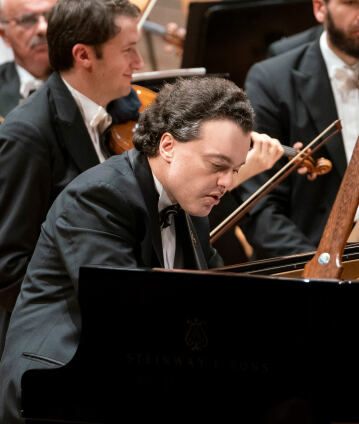Mariss Jansons and Evgeny Kissin

This concert with Mariss Jansons is in a sense a late-Romantic family reunion: Richard Wagner’s Rienzi overture will be presented alongside the triumphant First Piano Concerto by his father-in-law, Franz Liszt. His musical “descendant”, Richard Strauss, in turn, perfected the symphonic poem originally developed by Liszt, such as the famous Also sprach Zarathustra which is also performed in this concert. The evening’s soloist is Evgeny Kissin, one of the great pianists of our time.
At the age of two, Evgeny Kissin began to play pieces on the piano by ear and to improvise. When he was ten, he made his concert debut with Mozart’s Piano Concerto in D minor K. 466, followed by his first solo recital a year later. In 1988, the Moscow-born pianist was invited to play before Herbert von Karajan who spontaneously engaged the then 17-year-old for the Berliner Philharmoniker’s New Year’s Eve Concert. Today, Evgeny Kissin can look back on a long and fulfilling career. Mariss Jansons, who the Berliner Philharmoniker made an honorary member in January 2018, conducts these three evenings in which Kissin is the soloist in Franz Liszt’s heroic and brilliant Piano Concerto in E flat major which leads its listeners into a veritable labyrinth of interconnected movements and circulating themes. Liszt took Schubert’s Wanderer-Fantasie as a model, which can either be understood as a free-form sonata main movement or as a complete sonata cycle – including an adagio, scherzo and a superlative finale.
Before the Piano Concerto, which is counted as No. 1 in Liszt’s oeuvre since it was published and premiered first, we hear Richard Strauss’s tone poem Also sprach Zarathustra. The young Strauss declared his aim was not to write “philosophical music” or to attempt to “represent Nietzsche’s great work musically”, rather, the composer was fascinated by Nietzsche’s fundamental social criticism and the Dionysian approach to life which is expressed in the book. The outlandish theory of the “superhuman” is transformed in Strauss’s interpretation into a reflection on the natural powers of man, with whose help he can take up the fight against mediocrity and backwardness. After the Berlin premiere of this work on 30 November 1896, performed by the Berliner Philharmoniker under the baton of Arthur Nikisch only three days after the Frankfurt premiere, Otto Lessmann described the work as a “landmark in the field of pure instrumental music” in the Allgemeine Musikzeitung. His conclusion: “To even attempt to give a picture of the magnificence of the musical conception of this work in a concert report would be a futile effort.”
The concert closes with Richard Wagner’s captivating Rienzi overture which features a thematic potpourri of the battle cry (“Santo Spirito cavaliere”) and triumphal march (“Ertönet laut, ihr Freudenlieder”) from the third act of the opera.
© 2019 Berlin Phil Media GmbH
Related interviews
Artists
Our recommendations
- Fabio Luisi and Evgeny Kissin
- Claudio Abbado conducts a Beethoven Gala at the 1991 New Year’s Eve Concert
- Herbert von Karajan and Evgeny Kissin at the 1988 New Year’s Eve Concert
- The 2011 New Year’s Eve Concert with Simon Rattle and Evgeny Kissin
- 2017 Europakonzert from Cyprus with Mariss Jansons and Andreas Ottensamer
- Concert with Mariss Jansons and Hilary Hahn from Suntory Hall